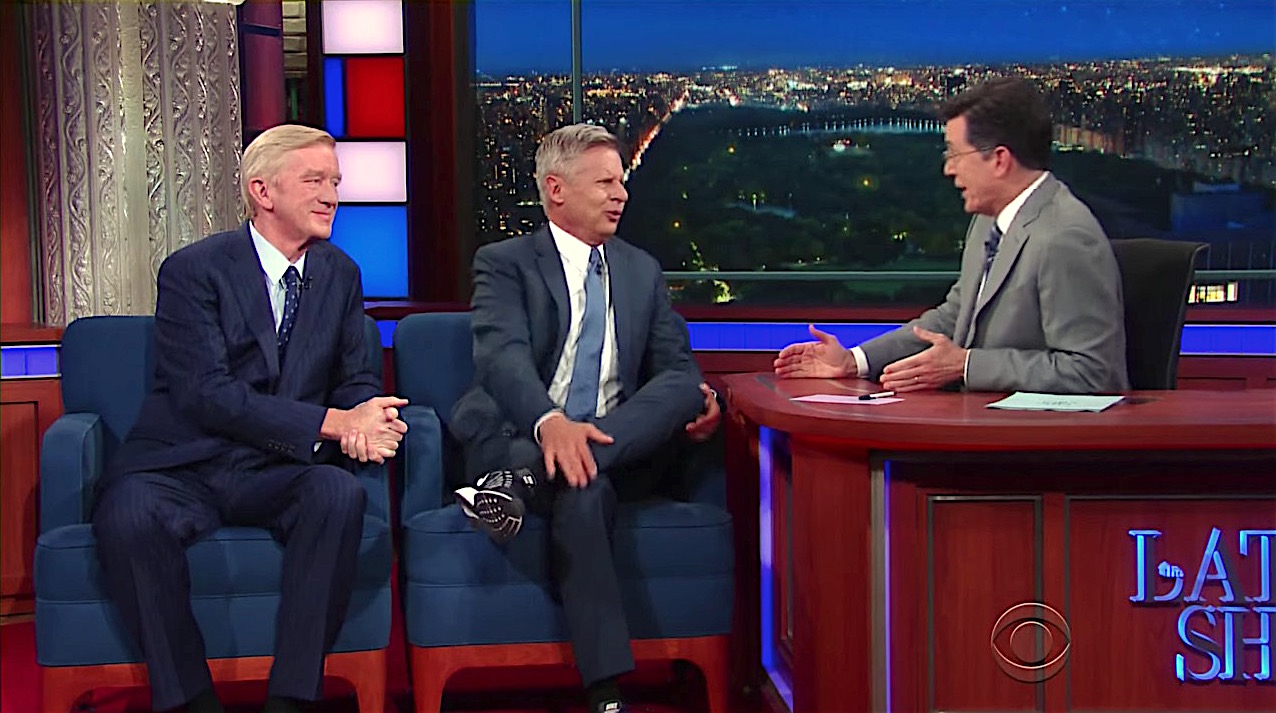Stephen Colbert talks pot, politics with Libertarian Party's presidential and VP nominees


A free daily email with the biggest news stories of the day – and the best features from TheWeek.com
You are now subscribed
Your newsletter sign-up was successful
Stephen Colbert interviewed the Libertarian Party's presidential slate on Thursday's Late Show, and he asked presidential nominee Gary Johnson and running mate William Weld why they're running. "Explain to the people out there, what's a libertarian," Colbert said. "Sell people on the libertarian idea." Johnson noted that he and Weld were both Republican governors of blue states, and explained their agenda as "the notion that people should be able to make their own decisions in their own lives. Always come down on the side of choice." Johnson said that for him, that means legal marijuana and legal abortion, gay rights, and no foreign wars.
"I like to say that I want the government out of your pocketbook and out of your bedroom," Weld explained. This year, "with the Democrats you get the government in your pocketbook, and with the Republicans it's much worse, because you got the government in your bedroom." Johnson embraced the label "fringe" candidates, applied by Donald Trump, noting, among other things, his long advocacy for legalizing pot. "I think, by 'fringe,' I think what he's saying is the majority of Americans are fringe, and that's just not the case."
Colbert also asked Johnson and Weld about the bad things they've said about Trump, and Johnson called his bleeped-out descriptor a "misfire," while Weld embraced his critique. "Who do you think you'd draw votes away from the most?" Colbert asked. "Hillary or Donald?" "I think more from the Rs," Weld said. "There's a lot of Rs out there that haven't signed on with Trump yet. We've got to be what they're waiting for." In the few polls, "there have been more votes from Hillary, to this point," Johnson added. "I think when all is said and done, it will be equally from both sides. And we wouldn't be doing this if there weren't the opportunity to actually win, but we've got to be in the presidential debates to make that happen." Watch below. Peter Weber
The Week
Escape your echo chamber. Get the facts behind the news, plus analysis from multiple perspectives.

Sign up for The Week's Free Newsletters
From our morning news briefing to a weekly Good News Newsletter, get the best of The Week delivered directly to your inbox.
From our morning news briefing to a weekly Good News Newsletter, get the best of The Week delivered directly to your inbox.
A free daily email with the biggest news stories of the day – and the best features from TheWeek.com
Peter has worked as a news and culture writer and editor at The Week since the site's launch in 2008. He covers politics, world affairs, religion and cultural currents. His journalism career began as a copy editor at a financial newswire and has included editorial positions at The New York Times Magazine, Facts on File, and Oregon State University.
-
 Quiz of The Week: 14 – 20 February
Quiz of The Week: 14 – 20 FebruaryQuiz Have you been paying attention to The Week’s news?
-
 The Week Unwrapped: Do the Freemasons have too much sway in the police force?
The Week Unwrapped: Do the Freemasons have too much sway in the police force?Podcast Plus, what does the growing popularity of prediction markets mean for the future? And why are UK film and TV workers struggling?
-
 Properties of the week: pretty thatched cottages
Properties of the week: pretty thatched cottagesThe Week Recommends Featuring homes in West Sussex, Dorset and Suffolk
-
 ‘One Battle After Another’ wins Critics Choice honors
‘One Battle After Another’ wins Critics Choice honorsSpeed Read Paul Thomas Anderson’s latest film, which stars Leonardo DiCaprio, won best picture at the 31st Critics Choice Awards
-
 A peek inside Europe’s luxury new sleeper bus
A peek inside Europe’s luxury new sleeper busThe Week Recommends Overnight service with stops across Switzerland and the Netherlands promises a comfortable no-fly adventure
-
 Son arrested over killing of Rob and Michele Reiner
Son arrested over killing of Rob and Michele ReinerSpeed Read Nick, the 32-year-old son of Hollywood director Rob Reiner, has been booked for the murder of his parents
-
 Rob Reiner, wife dead in ‘apparent homicide’
Rob Reiner, wife dead in ‘apparent homicide’speed read The Reiners, found in their Los Angeles home, ‘had injuries consistent with being stabbed’
-
 Hungary’s Krasznahorkai wins Nobel for literature
Hungary’s Krasznahorkai wins Nobel for literatureSpeed Read László Krasznahorkai is the author of acclaimed novels like ‘The Melancholy of Resistance’ and ‘Satantango’
-
 Primatologist Jane Goodall dies at 91
Primatologist Jane Goodall dies at 91Speed Read She rose to fame following her groundbreaking field research with chimpanzees
-
 Florida erases rainbow crosswalk at Pulse nightclub
Florida erases rainbow crosswalk at Pulse nightclubSpeed Read The colorful crosswalk was outside the former LGBTQ nightclub where 49 people were killed in a 2016 shooting
-
 Trump says Smithsonian too focused on slavery's ills
Trump says Smithsonian too focused on slavery's illsSpeed Read The president would prefer the museum to highlight 'success,' 'brightness' and 'the future'
